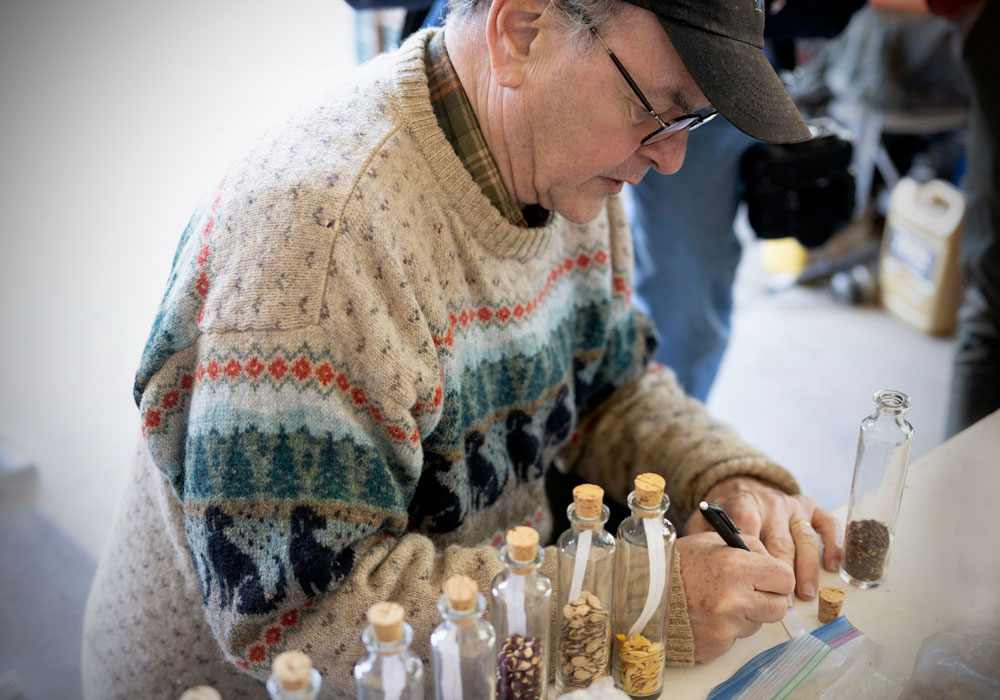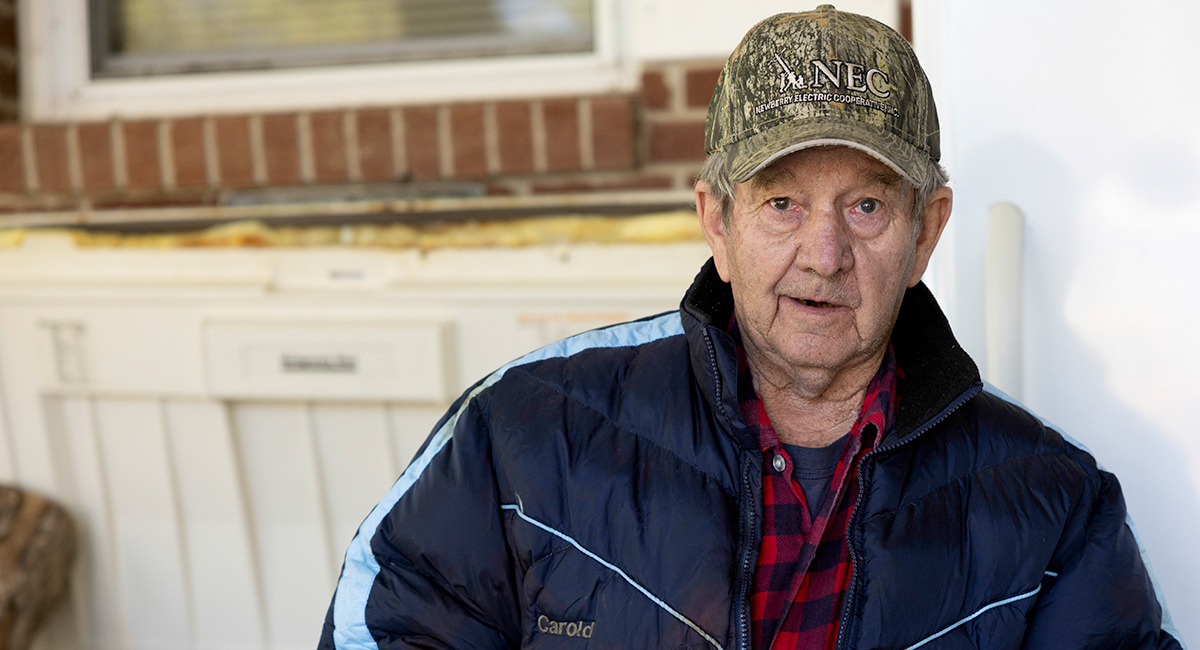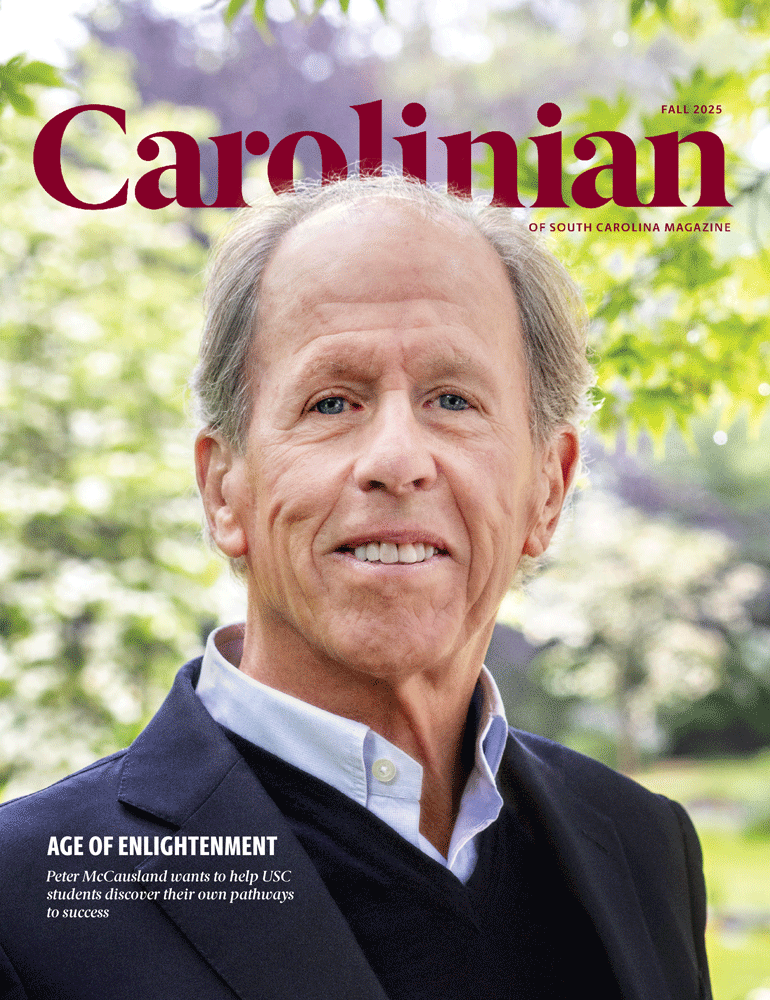When Carolinian magazine featured English professor and heirloom foodways expert David Shields in the winter 2019 issue, Shields had recently helped reintroduce Cocke’s Prolific corn to the American farmscape. A variety of field corn once grown by Thomas Jefferson at Monticello, Cocke’s Prolific was thought lost until Shields got wind that the Farmer family in Landrum, South Carolina, had been saving seeds and growing the unusual variety of corn for generations.
Four years later, Shields reached out to the magazine about another South Carolina seed saver, Carold Wicker, whose Newberry County freezer chest is the stuff of legend among farmers, gardeners and heirloom produce detectives like Shields. For the debut installment of Catching Up, we followed Shields to a small family home outside Pomaria, South Carolina, for a glimpse inside Wicker’s freezer and a lesson on the history and lore of Palmetto State produce from the folks who know it best.
TRANSCRIPT
Carold Wicker: That peanut's been in the family more than 200 years.
David Shields: Really?
Carold Wicker: My mother-in-law died two or three years ago, was 102, and she said those peanuts was in the family when I was a baby. And that's why I call them Mut Richards Peanuts.
David Shields: Can I take a look at those?
Carold Wicker: Yessir. Anything you want to, sir. All right. That's what we're here for.
That’s Carold Wicker, a home gardener from Pomaria, South Carolina, talking peanuts with University of South Carolina English professor David Shields. Shields isn’t here to buy produce, though. And Wicker isn’t selling.
Shields doubles as an heirloom foodways expert, and he’s here today to gather seed samples as part of a collaboration between USC and Clemson University. Clemson will store the seeds. Shields will write up the lore, which stretches back generations and helps illuminate the rich history of the Dutch Fork region of South Carolina.
I’m Craig Brandhorst, editor of Carolinian, the University of South Carolina’s magazine for alumni, and this is “Catching Up,” where we reconnect with some of the fascinating people featured in our pages over the years.
Shields’ effort to bring back Cocke’s Prolific corn, a fabled variety of corn once grown at Thomas Jefferson’s Monticello and rediscovered near Landrum, SC, was featured in our winter 2019 issue. Today, we’ve followed Shields to rural Newberry County on a brand-new adventure — this time to learn about a vast collection of rare seeds preserved in an overstuffed chest freezer in Wicker’s carport, just a few steps from the garden Wicker has been quietly tending for more than half a century. There’s a Thomas Jefferson connection on this trip, too.
The shutter clicks in the background are Carolinian photographer Kim Truett’s camera. The clucks are the chickens in Wicker’s backyard. But listen closer you might also catch something else: the light tinkling of dried seeds being funneled into Shields’ glass sample tubes, history being captured, preserved and documented for future generations.
Craig Brandhorst: So, Carold, you've been collecting these seeds for a long time.
Carold Wicker: Some of these are family seeds…I've been collecting for 62 years.
Craig Brandhorst: And your family was collecting prior to that?
Carold Wicker: Oh, yeah. Yeah.
Craig Brandhorst: So how far back are we talking?
Carold Wicker: Well, I'm 83 years old. When I was a child, my granddaddy — so he was like 80-something or 90-something years old.
Wicker isn’t a fulltime farmer. By day, the 83-year-old runs Carold Wicker’s Garage and Body Shop — there’s a sign just up the driveway, and his ringer is always on. But the man also knows how to grow things, from the Leitzey peas passed down on his mother’s side to the prized Dutch Fork pumpkin.
And everything coming out of Wicker’s freezer prompts another story. When Shields comes across a plastic baggie of the pumpkin seeds, he launches into a discourse on the regional pumpkin’s history and lore. A descendent of the classic Cherokee tan pumpkin brought to this part of the state by a land speculator in the late 18th century, it disappeared in Appalachia for a time but was kept going in the Dutch Fork region by home gardeners like Wicker.
Craig Brandhorst: Now, is there something particular about that variety of pumpkin that makes it superior or different from other pumpkins, commercially available or otherwise?
David Shields: It's a moschata pumpkin, and it's related to a series of pumpkins. Seminole down in in Florida, Dutch Fork is ours, the corn field pumpkin on the Virginia-North Carolina border, and then that Long Island cheese pumpkin — They all got the sutures, they all got the tanned sides, and they get into any sort of shape you want. They'll be round, they'll be pear-shaped. That tells you they're a real old you.
Craig Brandhorst: Do they have a different kind of taste?
David Shields: They do.
Carold Wicker: They do have a different taste, they do. And them is butter peas…
There’s a Dutch Fork pumpkin on the wall outside Wicker’s pantry, but as fall turns toward winter, Wicker is actually thinking more about summer produce — specifically, the watermelon rind preserves he puts in his holiday fruitcakes. After we leave, he’ll spend the rest of the day making them.
One person wants 33 pounds by Thanksgiving. Others want the recipe. But it’s not as simple as measuring out the ingredients and popping the batter in the oven. To make a Carold Wicker fruitcake he has to grow the fruit and then harvest the fruit. His wife, Judy, has to can the fruit and put it up in their pantry alongside the runner beans and snake beans, the stewed tomatoes, the sauerkraut and pickled beets that betray Wicker’s Germanic roots, the kudzu blossom jelly he swears by, the cloudy glass jug of persimmon beer.
And the fruitcake recipe is more complicated than it sounds. As Wicker explains, the watermelon that gives the cake its distinctive taste should be a particular variety introduced to him by Nat Bradford, a renowned figure in South Carolina’s heirloom produce movement. Bradford himself will drive up from Sumter later in the afternoon for a peek into Wicker’s legendary freezer.
If you know the Bradford name, that’s probably because you’ve seen it on specialty products sold around South Carolina. Over the past few years, it has become widely associated with the thin-rind heirloom watermelons grown on the Bradford family farm in Sumter.
But Bradford and Wicker were swapping seeds before the melon’s ascendence — and the seeds Wicker got off Bradford in a late-night exchange at a nearby Waffle House several years ago weren’t the ones Bradford is now famous for. They were for a thicker rind variety more suitable for preserving.
Does all the fuss really make a difference? For Wicker, the proof is in fruitcake.
Carold Wicker: Nobody else makes a fruitcake like I do because they don't — I had one lady come and got one one time, and she said, “Carold, I want you to give me the recipe I'm making.” I said, “You can't make them.” She said, “Why?” She said, “I can make 'em.” I said, “You got watermelon rind preserves? “I never heard of them.” You got pear preserves? “No.” You got fig preserves? “No.” I said you can't make it then!
David Shields: So what is this here?
This is the rhythm. Shields asks questions as he pours seeds into six-inch glass vials. Wicker offers his insights into the region’s foodways, sprinkling in gardening tips and family history.
David Shields: You know, this pea that Carold was talking about, this one right here —
Craig Brandhorst: The old timey English — is that what it says?
David Shields: English pea, yeah. Monticello grew it out this year. The seed that Carold gave to Nat, Nat had saved half of it. We sent it up to Jefferson's place, and they grew it out. And it turned out to be the extinct early frame pea that people have been looking for for years. This is a late 18th century, early 19th century, which was the classic English pea for one time. Now, you take a look at those peas? There are two kinds of peas: wrinkled sweet peas and these are sort of standard garden peas, which are full round. And this is the sort of shape that you have in a classic old English garden pea.
Carold Wicker: Now, here is time you have to plant them right now, yeah.
Craig Brandhorst: Now's the time to plant these, right now….
The seeds on the table in the carport hold endless secrets. Wicker and Shields pore over hand-labeled freezer bags the way others might pore over an old scrapbook or family photo album. Shields scoops up several bags of dried peas and shows them to Wicker. To the untrained eye they look a bit like black-eyed peas, only larger. To Wicker, they’re something much more special, which is why he shoves a bag in my coat pocket while we’re talking.
David Shields: So, all of these are Leitzeys?
Carold Wicker: Yessir. Now I take them in the house, I take them in the house and soak them overnight and cook them? Ohhh they’re good. That’s the reason I got so many. I eat so much.
Craig Brandhorst: So tell me this, because I may have missed this when I was in the pantry — Leitzey? What's special about them?
Carold Wicker: Well, they've been in the family — I'm 80, 80… 83 years old. When I was real young, my granddaddy taught me how — He had them all his life, so they old.
Craig Brandhorst: And you said they're particularly good.
Carold Wicker: Ohhh — the best pea. You won’t eat a pea any better than that.
Craig Brandhorst: Standard preparation? Just cook them like any other pea?
Carold Wicker: Now, In the summertime you pick ’em green. And shell ’em. But these here, they're dry. You got to soak ’em overnight. Take them home and eat ’em.
Craig Brandhorst: Oh, yeah? OK. Soak ’em overnight?
Carold Wicker: Soak ’em overnight. Put ’em in a pot and cook ’em. Put salt and pepper on ’em. That's it.
Craig Brandhorst: What would you recommend serving them with?
Carold Wicker: You eat them by themselves. Cornbread. Cornbread.
Craig Brandhorst: OK.
Carold Wicker: And don't invite nobody when you gonna eat them because you wanna eat them all!
Craig Brandhorst: Can my wife come?
Carold Wicker: Yeah. You let her eat them.
Craig Brandhorst: OK, I can share with her.
Carold Wicker: Yes sir.
This has been “Catching Up,” a production of the University of South Carolina Office of Communications and Marketing and Carolinian magazine. To read more about David Shields, check out “Field Notes” in the winter 2019 issue of Carolinian or visit the magazine online. To learn more about other fascinating people featured in Carolinian, keep your eye on the web page. You never know who we’ll catch up with next.
Photos by Kim Truett.


